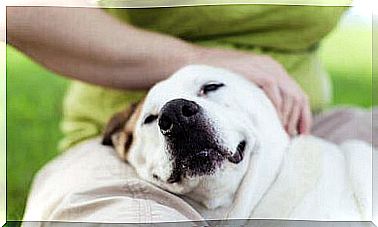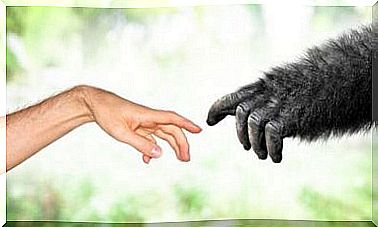The Stereotypical Behaviors Of Dogs

Have you ever seen your dog chasing and biting its tail? Or chasing invisible insects and chasing shadows? Does he growl at his reflection? Attack his food bowl? Does he lick certain parts of his body obsessively? It is likely that your dog suffers from a behavioral disorder, or stereotyped behavior, which can have physical or psychological causes. To prevent your pet from getting hurt, it is important to go to the vet right away, so that I can advise you on the best treatment for this problem.
Some details on stereotypical behavior in dogs

Stereotypes or compulsive behaviors are repetitive behaviors that always manifest themselves in the same form and in the same sequence, and have no apparent function or purpose. They present themselves as misplaced actions, and can get to be exaggerated and frantic.
Importantly, they only occur in domestic, zoo and farm animals, those found on farms, kennels, and stray dog shelters. Free-living animals do not develop these stereotypical behaviors. All the clues, therefore, suggest that the cause of these behaviors lies in the domestication and, above all, in the confinement, which cause this type of abnormal behavior.
The exasperated repetition of these behaviors can cause more or less serious injuries in dogs, such as mouth injuries due to bites, acral dermatitis when compulsively licking extremities or even ulcers.
In agreement with the results of some studies, it was possible to establish a racial predisposition to the development of certain behaviors. For instance:
- Tail chasing: German Shepherd and Bull Terrier.
- Compulsive licking of extremities: Labrador, Dobermann, Akita, Maltese, Dalmatian, English Setter, Shar-Pei, Medium Schnauzer and Weimaraner.
Among the physical causes that can trigger similar behaviors are, among others:
- Brain problems: hydrocephalus, tumors, meningoencephalitis.
- Compression of the cauda equina and tail fractures.
- Skin diseases, such as dermatitis and food allergies or insect bites.
- Other causes: viral diseases, such as distemper, injury to peripheral nerve connections, eye problems, lead poisoning and hepatic encephalopathy.
Stress and anxiety can trigger some stereotypical behaviors

If the behavior does not have a physical origin, it is often triggered by a state of stress or anxiety. In these cases it is important to remember at what moment it began to manifest itself: if it coincides with a move, the arrival of a baby or another pet in the house, or if it is determined by other contexts, such as animated discussions in the family or when aggressive body language is used with animals, such as excessive gesticulation or shouting.
Usually these repetitive attitudes are due to a state of frustration or conflict to which dogs are subjected for a sufficient time to cause them difficulties in understanding, for example, what reality is and what suggestion is, and to get out of protracted stressful situation. One example is depriving dogs of the stimuli necessary for them to develop normal behaviors. In fact, if you always keep them locked up, without allowing them to fulfill their physical needs, such as running and exploring, it is very likely that they will begin to develop some stereotyped behaviors.
Although situations of conflict and frustration can be frequent, the problem is not these situations per se, but rather the fact that they are protracted over time. It is then that the adaptation mechanisms are interrupted and pathological situations arise. Furthermore, in addition to the occurrence of various clinical problems, animals will tend to consume much more energy than normal, which will make them perpetually tired.
Owners are also likely to reinforce these behaviors in dogs when, for example, they pay special attention to the dog when it behaves abnormally. Unintentionally, they are making dogs repeat these actions for the sole purpose of receiving attention, just like children. Another less problematic, but no less serious cause can be boredom.
For these reasons, if your dog begins to exhibit some abnormal behaviors, in addition to immediately taking him to the vet, try to resolve the situations that could cause these attitudes. Also, get your dog to follow a routine that stimulates the mind and body through games, walks and toys. Caress him often to ease his stress and look for the best way to prevent him from having these abnormal behaviors. Never chastise him. This will only make the situation worse. Arm yourself with patience and offer him lots of love and understanding.









